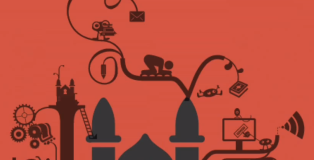Do we need to rethink what constitutes terrorism acts based on the ideology and cause behind the acts?
Following the tragic
death of 21-year-old environmental activist Rémi Fraisse in a police grenade
blast on the construction site of a dam in the early hours of Sunday 26th
of October 2014, I could not help but notice the hypocrisy of local and
national officials who seem to understand the demands and frustrations (because
their demands are not met when carried out through regular channels) expressed
in these violent acts.
I believe that the level
of violence displayed by this group of activists is close to acts of terrorism.
Indeed, police task forces who were sent to protect the construction sites
where heavy machinery was kept “were attacked by the violent group of activists
(approx. a hundred activists) who were throwing Molotov cocktails, pyrotechnic devices
and stones from outside the construction site, on the fence and inside the site”[1]
stated Claude Déren, prosecutor of the Republic. Consequently, these activists had planned their attack of the construction
site, they had come prepared (Molotov cocktails can’t be made out of thin air) and
where determined to seriously jeopardise further developments in the construction of
the dam… and their own lives.
After hearing these
activists explain the necessity to resort to violent forms of protest on France Info, it was undeniable that their
action that night was indeed planned. The fact that the government, local and
regional authorities are unable to see that the actions planned and carried out
by this group of activist are, according to French law[2],
terrorist acts is simply baffling. But what is even more outrageous and surreal
is that they are excusing these terrorist
acts and that the police forces end up being held responsible and under
legal examination. How is it possible that police forces end up being accused
by the violent activists, who initiated the violence[3],
of extreme and violent implementation of security measures?
I wonder what would
have been the reaction of government officials if these activists had a
different ideology and cause. What if the police had killed a young Kader while
he was expressing his frustration at the soaring unemployment statistics and
the consequent lack of social mobility with a group of violent activists
representing one or several civil society organisations? Would he be considered a ‘terrorist’? Based
on what? His name? His skin colour? His presumed religion? His presumed social and
economic background?
All I know is that, in
France, some environmentalists have been intentionally and purposefully using
violent means for a while now (in 2013, violent and lasting actions were documented
in Notre-Dame-des-Landes but did not cause any death) and that nobody seem to
equate their actions with terrorism… Why aren’t they? Why aren’t they condemn
for using violent forms of protest? Is it because they are violent for the
environment, a cause that would make they struggle more friendly? But then, we
would need to redefine terrorism and allow violent means of actions for all
causes, wouldn’t we?
[1] Les forces de l’ordre, qui avaient pour mission de protéger l’aire
de stockage des engins de chantier, «ont été attaquées en règle par le
groupe de manifestants violents, approximativement une centaine, qui jetaient
des cocktails Molotov, des engins pyrotechniques et des pierres sur le grillage
et à l’intérieur, depuis l’extérieur», a rapporté le procureur. http://www.20minutes.fr/societe/1468843-20141027-barrage-sivens-sait-circonstances-mort-remi-fraisse
[2] Code pénal (art. 421.1) « Constituent des actes de terrorisme,
lorsqu'elles sont (L n°96-647 du 22 juillet 1996) « intentionnellement » en relation avec une entreprise individuelle ou collective ayant pour but de
troubler gravement l'ordre public par l'intimidation ou la terreur les actes
suivants : les atteintes à la vie… les vols, les destructions, les
dégradations et détériorations ainsi que les infractions en matière
informatique…, la fabrication ou la détention de machines. (art. 421.2) Constitue
également…le fait d'introduire dans l'atmosphère… (art. 421.3) Constitue
également…le fait de participer à un groupement formé ou à une entente établie
en vue de la préparation, caractérisée par un ou plusieurs faits matériels,
d'un des actes de terrorisme mentionné aux articles précédents.
[3] Refer to the following
article commenting a video footage captured by an activist on the afternoon of Saturday
25th of October 2014 http://www.liberation.fr/societe/2014/10/28/sivens-une-video-montre-des-affrontements-qui-ont-precede-la-mort-de-remi-fraisse_1131187
or go directly to the video https://www.youtube.com/watch?v=9n4BWYNcFrk#t=311

